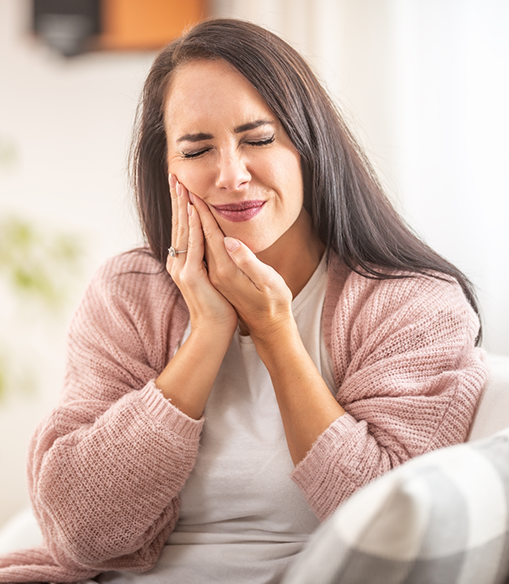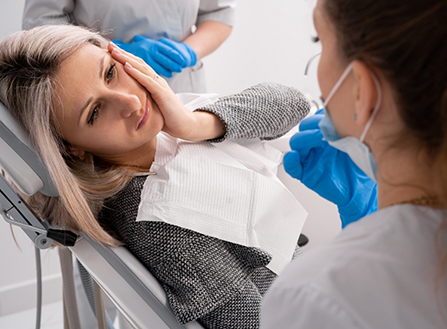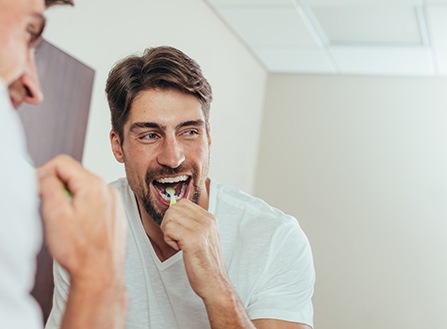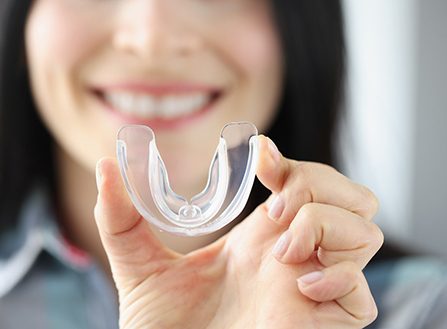Emergency Dentist Jerome
We’re Here for You When a Dental Crisis Occurs

Burton Family Dental Jerome encourages you to call our office right away if you or a loved one experiences a dental emergency. Helping you out of pain is our priority, so you can entrust us to work quickly as we address your immediate symptoms as well as develop a custom treatment plan to repair the underlying issue. As an emergency dentist in Jerome, Dr. Burton sees all types of dental injuries, so you can count on us to be here for you when a crisis occurs.
Why Choose Burton Family Dental Jerome for Emergency Dentistry?
- Nitrous Oxide Sedation Available for Nervous Patients
- Emergency Dentist with 10+ Years of Experience
- Safe & Effective Treatment for Children and Adults
How We Handle Dental Emergencies

- Call our office – The first thing you’ll want to do is call our office. Letting us know about your emergency is the fastest way to get in for an appointment. While working to schedule a time for you to come in, we’ll also offer instructions on how to take care of your problem while you wait at home.
- Be seen by Dr. Burton – Once in our office, we will escort you to a treatment room and take images of your mouth. Dr. Burton will then examine the problem area and develop a treatment plan based on her findings.
-
Receive essential care – After discussing how we plan to treat your injury, we will begin to execute each step to help you out of pain and restore your smile. This might include antibiotics, a dental filling, a custom dental crown, root canal treatment, tooth extraction, or tooth replacement.
The Most Common Dental Emergencies
The kinds of dental injuries that can occur are vast; however, most can be treated by a trusted emergency dentist like Dr. Burton. While it might seem as if going to your local ER is the better option, you’ll avoid long wait times by calling our office for an appointment. If you’re unsure whether the problem you’re experiencing is an actual emergency, please, view the icons below to learn more.
Keys to Preventing Dental Emergencies

Some dental emergencies are simply unavoidable. That being said, though, it is possible to significantly lower the chances of urgent dental problems occurring by following a few simple steps. While our team is ready to help if a dental emergency strikes, we’d prefer to help our patients avoid oral health issues in the first place. As such, here are some tips for reducing your risk of needing emergency dental care.
Visit Your Dentist Regularly

Even if your smile feels fine, you should take the time to visit your dentist twice a year. These appointments can help you get rid of harmful plaque and tartar long before they can result in cavities. On top of that, many dental issues often go unnoticed during their earliest stages. Our team can identify the potential warning signs of gum disease and tooth decay so that they can be dealt with before they turn into emergencies.
Maintain Good Oral Hygiene At Home

Many dental emergencies are the result of missteps in oral hygiene. Failing to keep your mouth clean can significantly raise your risk for cavities and gum infections. It’s highly recommended that you brush at least two times a day for two minutes each in order to protect your smile. You should also get in the habit of flossing daily so that you can clean the spaces between your teeth that you can’t reach with a toothbrush.
Stick to a Nutritious Diet

Eating too many sugary and starchy foods will make you more likely to suffer from tooth decay and gum disease. That doesn’t mean that you need to avoid such foods altogether; you simply need to enjoy them in moderation to minimize the impact they have on your oral health. Try to eat more foods that are good for your teeth and gums. Crunchy fruits and vegetables can be a great choice since simply chewing them can help get rid of plaque.
Wear a Mouthguard

Plenty of sports and other athletic activities come with the risk of suffering from a sudden blow to the mouth or jaw. As such, it’s a good idea to get a mouthguard in order to ensure that your teeth are protected if an accident happens. On top of that, you may also want to get a nightguard, which is a type of mouthguard that is worn when you go to bed. This appliance can help protect your teeth from any grinding or clenching that might occur while you slumber.
Use Tools to Open Packages, Not Your Teeth

The temptation to use your teeth to open a stubborn package can be very strong. However, over time it can end up weakening your enamel, thus leaving your smile more susceptible to damage. Thus, instead of tearing open packages with your teeth, you should instead use an appropriate tool, such as a pair of scissors.
Dental Emergency FAQs
What Does Throbbing Tooth Pain Mean?
If you are experiencing throbbing tooth pain, it is likely a sign of an infection or inflammation within the tooth. Cavities or cracks allow air and bacteria to reach the sensitive inner area of your tooth where the pulp lies. This can result in painful irritation and potential infection of the pulp nerves. This can also occur if tooth decay is present.
In other cases, throbbing teeth could be due to chronic teeth grinding and jaw clenching. If you are experiencing throbbing pain, schedule an emergency appointment with your dentist near Jerome as soon as possible.
Will a Toothache Go Away on Its Own?
Generally, toothaches will not go away on their own. For this reason, it is best to schedule an emergency appointment with Dr. Burton as soon as possible to rule out anything serious. This can help her catch any underlying problems before they get worse.
Sometimes, toothaches involve pain around the tooth and not inside it. These can go away on their own, for example if they are caused by an irritation in the gum surrounding the tooth.
How Should I Sleep with Tooth Pain?
When dealing with a toothache at night, keep your head elevated above your feet. This will prevent blood from rushing to your head and intensifying your toothache. To help keep you comfortable, you can take over-the-counter pain reliever as needed and avoid foods that are acidic or hard right before bed. A cold compress held to the face over the aching tooth can also help dull some of the discomfort so you can sleep. Be sure to contact your emergency dentist near Jerome in the morning and schedule an emergency appointment if you have not already.
How Do I Know if My Toothache is an Infection?
If you have a sore or throbbing tooth, it is likely that it is infected. If it is accompanied by a bitter taste in your mouth, chronic bad breath, tooth sensitivity, the loosening of teeth, red or swollen gums, or a draining sore on the gums surrounding the aching tooth, it is most likely a dental infection.
The only way to know for sure if your tooth is infected is to schedule an emergency appointment with Dr. Burton who can take X-rays and provide a detailed diagnosis.
Preventive Dentistry Children's Dentistry Restorative Dentistry Dental Implants Cosmetic Dentistry Orthodontics & Invisalign® View Our Services
